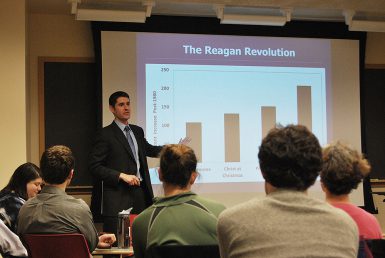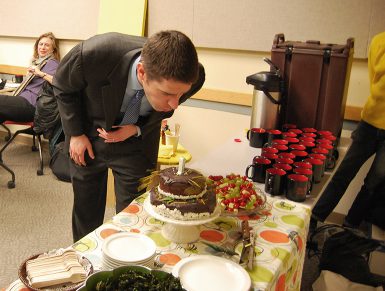Third Half talk examines presidents’ influence on religious conversation

In February, President Obama delivered an address at the National Prayer Breakfast and his comments resulted in a backlash from commentators who called his remarks “glib, facile patronizing” and “offensive.”
“The mystery is why those comments generated these kinds of comments,” said Kevin Coe, assistant professor at the University of Utah Department of Communication, Friday in RTV 226.
Coe presented “The Evolution of Religious Communication in American Politics from FDR to Obama” during the inaugural talk of the Media School Third Half series. His work explored how politicians discuss religion and how that’s shifted during the modern presidency.
The reason the Obama remarks set off such a reaction is that the president sets the tone for who matters in the political discussion, Coe said.
“Who we are is what is at stake,” he said.
Religion always has had a role in American society, Coe said, and people connect with politicians through a shared faith.
Starting with Franklin Delano Roosevelt, Coe said religion has played a role in the presidency, but how politicians discussed religion changed with the presidency of Ronald Reagan.
In the 1970s, Christian conservatives began to mobilize into a political movement with such groups as the Moral Majority, and no longer remain on the electoral sidelines. These groups realized that if they mobilized, they could begin influencing politicians and things will change, he said.
In 1976, Jimmy Carter received support from the Christian conservative movement, Coe said, but it became disenchanted with his policies. And then came Reagan.
“He understood how to speak their language,” Coe said.
During his research, Coe conducted a content analysis of 400 major public presidential speeches from FDR to the George W. Bush era to see how often they mentioned God. Reagan mentioned God in almost every major address he delivered, Coe said, and changed how presidents talk about religion.
“Reagan completely changed the extent to which religion is a part of that world,” Coe said.
Presidents have relied on two styles to talk about religion, according to Coe: The petitioner style that is used for thanks and requests, and the prophetic style that declares God’s will.
From 1933- 1980, Coe said presidents used only the petitioner style. But from 1981- 2008, the prophetic style was used twice as much.
“Reagan brings that in, and it doesn’t really go back,” Coe said.
In the post-Reagan era, there has been some shift, Coe said, and Obama was a key figure in that change.
In Obama’s inaugural address, Coe said the president talked about people of all faiths, including non-believers, on par with Christians. He said that mention gave non-Christian religions a place in the political conversation.
“The presidency has long been a place where we come to understand who counts in America,” Coe said.

Harmeet Sawhney, professor and director of graduate studies, said Coe’s work is rooted in strong research and illustrated his points well.
“The richness of the empirical research came out very strong,” he said.
Sawhney said an interesting part of Coe’s work looked at how politicians alter their speeches while talking in different counties.
“It’s interesting stuff,” said associate professor Andrew Weaver, and Coe’s work is widely applicable to a number of academic disciplines, such as journalism, political science and media studies.
Weaver said Coe was invited because his research has a broad appeal, appropriate for the new Third Half series. The “third half” is a rugby term that refers to the time after a game ends when players retreat to the pub to share a drink and engage in conversation, according to Weaver. For The Media School, the Third Half is a chance to bring faculty and students together to spark discussion about ideas and have intellectual conversations, he said.

